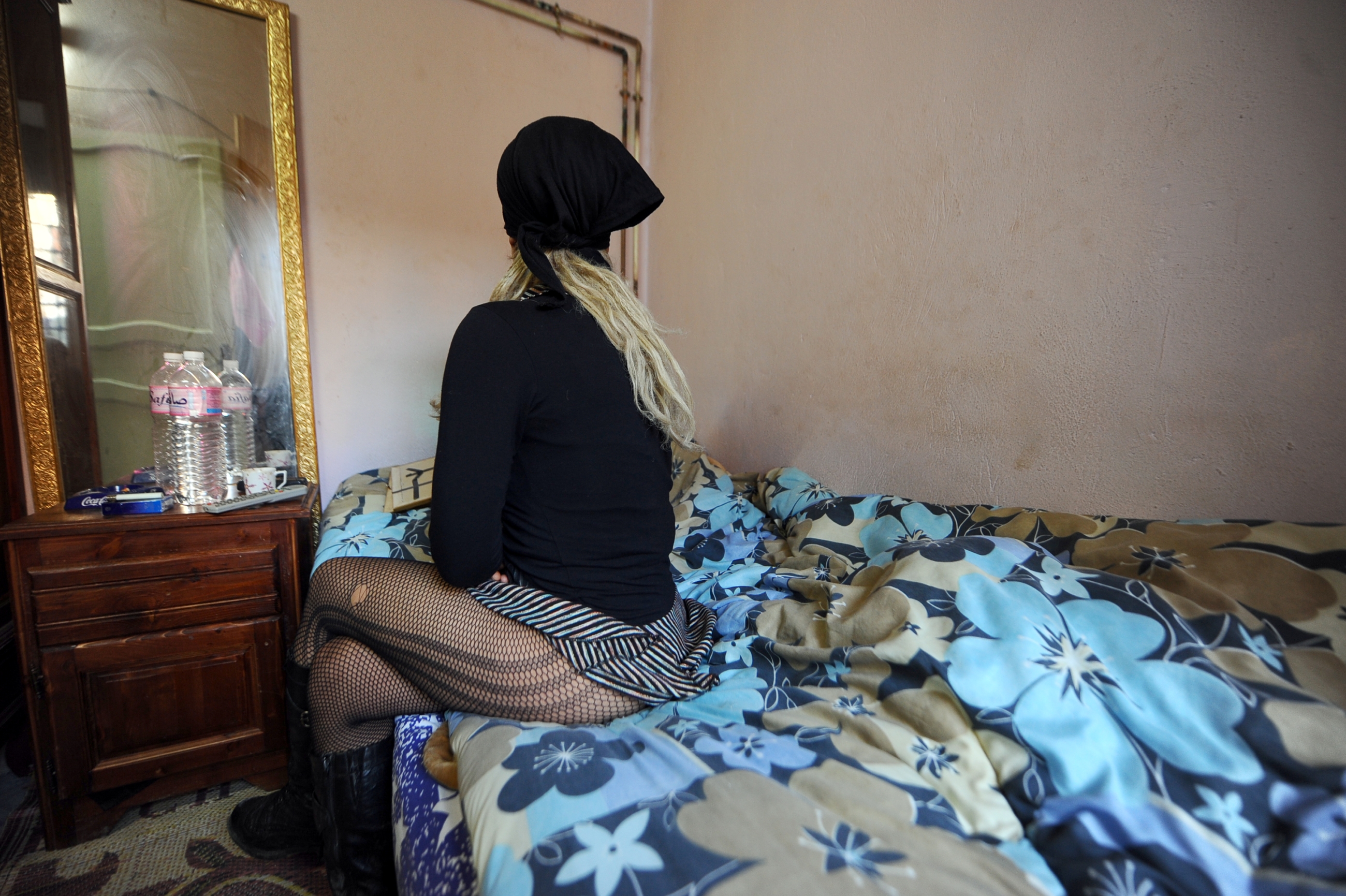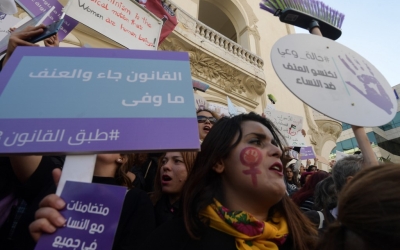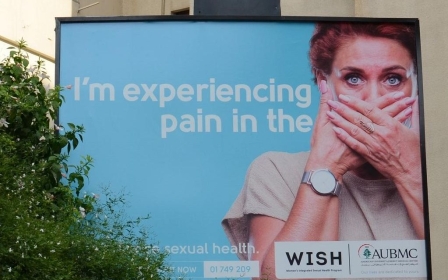Tunisia's sex workers face 'moral crusade' and precariousness

In mid-June, Tunisian Islamic political party El-Karama launched an initiative to ban all forms of sex work in the country and penalise sex workers.
"The dignity of a Tunisian woman is not for sale," party leader Seifeddine Makhlouf posted on his official Facebook page on 19 June.
New MEE newsletter: Jerusalem Dispatch
Sign up to get the latest insights and analysis on Israel-Palestine, alongside Turkey Unpacked and other MEE newsletters
The new campaign to criminalise sex work in a country where prostitution laws are living relics of the colonial era is somewhat of a political anomaly in Tunisia.
"Political parties shun sex work issues. It's a taboo subject," says Souhaila Bensaid, founder of the Tunisian Association for Positive Prevention (ATP+) for sexual and reproductive health.
But increased animosity against sex workers over the past decade has turned into "a moralistic crusade," according to Bensaid, leaving women in increasingly precarious situations with little to no protection.
A colonial history of sex work
"Our sex work system dates back to the French occupiers in the 1940s, and no political party has ever challenged it," Bensaid, whose organisation supports around 35 legal sex workers in the capital Tunis, told Middle East Eye.
Throughout Tunisian history, the status of sex work has been influenced by successive colonial authorities. Under the Ottoman empire, a civil servant known as the menzouar was in charge of collecting dues from sex workers. The sex trade was therefore encouraged at the time to increase tax revenue.
The French colonial system that would take over control of Tunisia between 1881 and 1956, perceived the sex trade as a form of lifestyle management, researcher Christelle Taraud told publication Eurozine in December.
"The French colonialists did not want to marry colonised women, notably because of scientific racism - but nonetheless 'reserved' some for sexual consumption," Taraud said.
This was organised by setting up state-regulated brothels in designated and closed areas of all major cities of Tunisia. However, applicants had to fulfil strict criteria, Bensaid says, "such as being single, between 20 and 50 years of age and not suffering from any mental or physical illness".
Transgender individuals, a number of whom "depend on sex work for their very survival," have never been considered for inclusion in state-sanctioned brothels in Tunisia, she notes.
Despite being regulated by the government, "regrettably, the state has never thought of any form of pension or social insurance" for sex workers, Bensaid adds.
Today, Tunisia's penal code prohibits prostitution and solicitation outside state-registered brothels, which continue to be limited to designated areas.
For some Tunisians, like Mouna, sex work has provided a livelihood when they had few, if any, other options.
"For women like me, from poor families and without qualifications, there are hardly any other opportunities on the labour market," she tells MEE. "Both my mother and my son depend on my earnings."
But even though Tunisia has avenues for state-regulated sex work, it is not easy to enter the business legally.
"In 2006, I ended up in the illegal trade," Mouna, who asks to be referred to by a pseudonym, says. "In order to get into a state-regulated brothel, I needed a broker and support from a legal brothel manager.
"Without a network, I was nowhere."
If they do manage to qualify, sex workers who are able to work in state-sanctioned brothels are then bound by a lengthy list of rules.
"They have to undergo medical examinations and tests, and are not allowed to drink alcohol or do drugs (on the job), nor to stand at the door or outside of their workplace," Chaima Trabelsi, an employee at ATP+, says.
"See it as military service," Trabelsi adds. "Outside of fixed days off, they're not allowed to leave their post. For every outing, a special permission is required."
The protection granted by working in a brothel does not come for free, however.
For each session with a client, the price of which may vary between 3 Tunisian dinars ($1) and 10TD ($3.50), sex workers must turn in one-third of their earnings to the brothel owner.
A decade of crackdown
Bensaid notes that El-Karama's plan to abolish legal sex work in Tunisia didn't come as a shock, instead arriving in the wake of nine years of slow erosion of the legal sex trade.
'The sex trade is overrun by a religious witch hunt'
- Souhaila Bensaid, founder of ATP+
"Since 2011, the bulk of state-registered brothels have been closed, burned down or swept empty," she says. "The state's maison closes [brothels] are dying out."
A number of violent rallies by religious conservatives in 2011 have been viewed as having an influence on the government's decision to implement a wave of closures of state-regulated brothels around the country.
In parallel, fewer and fewer women have been allowed into state-sanctioned brothels over the years. The strict rules of the trade have been used to dismiss workers should they fail to comply, further contributing to the decline of legal sex work.
Tunisia's Ministry of Interior has long claimed that the stealthy phasing out of maison closes was necessary to address issues in compliance with Tunis' recent legislation vis-a-vis human trafficking.
"Since Tunisia adopted the law in 2016 on human trafficking, the decree regulating prostitution raises questions," a spokesperson of the ministry's "morality unit" was quoted as saying in 2018 by news site Inkyfada.
"The manager of a brothel could be seen as an exploiter, and prostitutes as victims of a trafficking network."
These concerns were echoed by El-Karama’s Makhlouf, as he argued for the party's proposed legislation.
"The bill aims to harmonise the constitution, the prostitution law [sic] and the Human Trafficking Act," the party leader echoed on his party's Facebook page.
For Bensaid, the crackdown is a grim side effect of Tunisia's 2011 revolution.
"Since 2011, Tunisia has struggled under the yoke of conservative Islamists," the fieldworker states. "The sex trade is overrun by a religious witch hunt."
Conservative political parties and groups are far from the only ones to have a negative impact on sex workers' lives and livelihoods, as sex workers remain far too often unrepresented and unheard amid the national debate surrounding their very livelihoods.
"There are too many hurdles to overcome," Trabelsi says. "Tunisian sex workers live in a world steeped in contempt, denigration and judgement.”
Vulnerable on the streets
The latest crackdown on the legal sex trade comes as state-registered brothels haven't reopened since March due to the coronavirus pandemic.
'Tunisian sex workers live in a world steeped in contempt, denigration and judgement'
- Chaima Trabelsi, ATP+ employee
Increasingly, Tunisian sex workers have reported systematic exposure to abuse as efforts to shut down the brothels have escalated.
In 2011, the country counted 300 legally registered sex workers. By late 2019, their number was down to 70.
The crackdown on legal sex work, however, does not mean that the business is disappearing. Instead, more sex workers are turning to the illegal trade despite the increased risks.
"Since most legal sex workers are pushed into the streets, the market has become saturated and prices have plummeted," Mouna says. "The competition is cutthroat. Underground sex workers can no longer afford to help each other."
With little knowledge of their rights or how to keep themselves safe, women new to the underground sex trade often have a hard time advocating for themselves.
"I see in particular vulnerable people turn to sex work. Many of them have not been taught to stand up for themselves," Bensaid says. "They tolerate literally anything, without being protected by contraceptives. Sometimes they exchange sex for a sandwich or a place to stay overnight."
Bensaid adds that the lack of legal protection leaves sex workers vulnerable to abuse.
"Underground sex workers are fair game. Their activities seemingly an open invitation to sexual and physical violence," she notes.
Her observations are corroborated by the conclusions of a 2018 ATP+ survey among underground sex workers.
'Underground sex workers can no longer afford to help each other'
- Mouna, Tunisian sex worker
"Blackmail, threats, intimidation, humiliation, racketeering, physical assault, rape... are all reportedly tools adopted by their assailants," Bensaid wrote in the report at the time. "In such cases, the victims, unprotected by the law and not cared for by specialised structures, often resort to silence."
Among those accused of abusing and assaulting sex workers are none other than police forces, as documented by a 2015 report by Amnesty International.
Risking up to two years in prison for engaging in the sex trade illegally, sex workers can end up exploited and blackmailed by police officers. The international NGO identified police as being "primarily" the source of "sexual exploitation, blackmail and extortion" against sex workers in Tunisia.
"To stay out of prison, underground sex workers have to share part of their earnings with police officers," Trabelsi confirms.
One of the sex workers interviewed by Amnesty International described being sexually harassed while being arrested.
"The police who arrested me called me a 'whore' and said that I had no right to defend myself. When they searched me they groped my breasts," she said. "They think that everything is allowed and that you are nobody because you work as a sex worker."
Mouna, who also does fieldwork for ATP+, shared comparable experiences.
"Illegal sex service providers failing to pay police bribes better be picky in choosing their work locations," she advises. "The police regularly sweep the streets. They caught me twice - once when I was about to jump in a taxi."
According to Mouna, finding oneself in an area known for hosting illegal sex work is enough to get arrested. "If you have [condoms] in your pocket, you're screwed," she says.
But Mouna, with 14 years of experience in the field, remains convinced that the government is fighting a losing battle.
"The profession will never disappear. One day, politicians will have to face the real world and legalise sex work."
Middle East Eye delivers independent and unrivalled coverage and analysis of the Middle East, North Africa and beyond. To learn more about republishing this content and the associated fees, please fill out this form. More about MEE can be found here.






